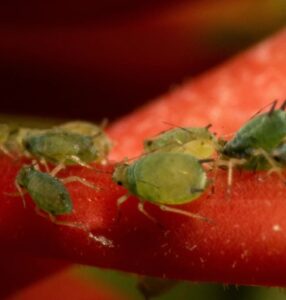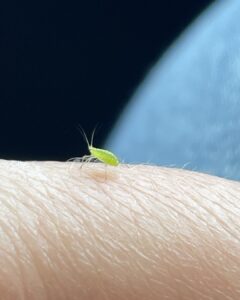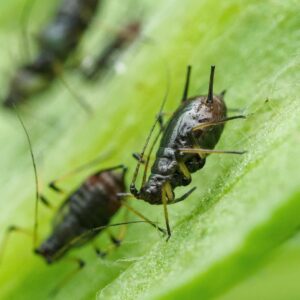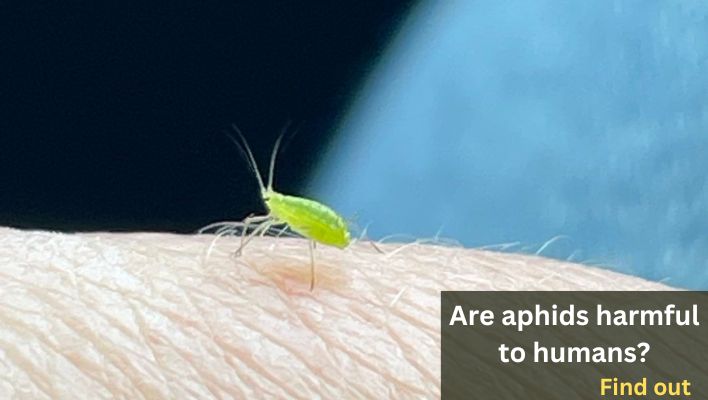Many gardeners are familiar with aphids and how dangerous they can be to the garden’s health. Many don’t know whether these aphids are harmful to humans in any way, including gardeners.
Gardeners need to realize that aphids are one of the garden’s most common pests. The bad news is that these harmless-looking creatures can multiply quickly. They will start as small colonies of 1 or 2 aphids and can grow into large swarms if left unchecked for long periods.
If you’re not careful, they can be quite destructive. Aphids look like tiny pearls and reproduce in various colors, including green, yellow, and red. They are sometimes referred to as plant lice or leafhoppers.
An infestation of aphids could lead to problems in your gardens and landscape. Although aphid is not usually a serious threat to humans, it is possible that a large number can cause some damage to your crops or plants. The following article will give insight into what you need to do when dealing with this pesky insect.
What are aphids
Aphids are small, soft-bodied insects that live and feed on plants and can cause damage to the host plants. They’re generally tiny less than one-tenth of an inch long, but they can cause serious damage to your garden if you don’t take action. Aphids are true bugs belonging to the order Hemiptera (also known as Heteroptera).
They have piercing-sucking mouth parts that help them feed on plant sap, which can cause damage to their hosts and make the plants unattractive to insects like pollinators.
They are often found in clusters on the undersides of leaves, producing a sticky glue-like substance called honeydew, which they use to feed on plant sap and leave behind a black sooty mold.

There are many different species of aphids, each with its characteristics and feeding habits. Some aphids are parasites that feed only on another plant’s sap; others attack specific plants, and still, others move from one plant to another as they feed (this is especially common among rose aphids). They are all considered pests.
Aphid infestations are often first noticed when the plant starts to wilt or die. The leaves will turn yellow or brown, then fall off in patches. If you see this happen with your houseplants, you may have an aphid infestation.
Are aphids harmful to humans?
Aphids are not harmful to humans.
Aphids are insects that feed on plants, and they can be a big problem for your garden, lawn, or other green space because they can cause damage to plants by sucking the sap out of them. They are a common pest that can be found in many plants.
They may attack leaves, stems, roots, or flowers. Aphids can cause stunting of new growth and reduce the amount of fruit produced by trees, leading to decreased quality and quantity of produce.

However, this is not a common occurrence as most aphids require high temperatures to multiply and reproduce, so you won’t typically see them on your plants unless there has been some form of damage or stress put on them by either natural or human intervention (such as over-applying insecticides).
Are Aphids Poisonous to Humans?
No, aphids are not poisonous to humans. While they can potentially transmit plant diseases to crops and plants, they are not poisonous to humans if accidentally ingested or touched.
However, in some cases, people might be concerned about consuming aphids if they are present on fruits or vegetables. However, consuming a few aphids accidentally is generally considered safe and not a cause for concern. Many fruits and vegetables undergo thorough washing and processing before reaching consumers to minimize the presence of insects. or pests.
It’s always a good practice to wash fruits and vegetables before consuming them, not only to remove any potential insects but also to reduce the risk of ingesting any pesticide residues that might be present on the surface.
Are black aphids harmful to humans?
If common green aphids are not harmful, what about black aphids?
Black aphids, like other types of aphids, are not harmful to humans. They are primarily pests of plants and feed on the sap of plants using their piercing-sucking mouthparts. While they can cause damage to plants by depleting their nutrients and causing leaf distortion, they do not pose any direct harm to humans.

Black aphids are usually more of a concern for gardeners and farmers because of their potential to damage crops and ornamental plants. They can also transmit plant viruses, which can affect the health and productivity of plants. However, they do not bite, sting, or carry diseases that are harmful to humans.
If you encounter black aphids on your plants, it’s important to manage their populations to prevent excessive damage to your plants, but there is no need to worry about any harm to yourself or your health.
Can aphids live in your hair?
Aphids can’t live on human hair; they need plant sap to survive explained above.
If you find some aphids in your hair, they probably got there by riding on a fly or a moth or while you were working in the garden. The aphids are just doing what they do; they’re trying to find food and looking for whatever will serve the best meal.
As explained above, aphids are tiny insects that feed on plants. They don’t have mouths and can’t eat or drink. However, they have a tube-like mouth called an aphidophore (which they use to suck up nectar from plants).
Human hair is not a plant, so it doesn’t provide aphids with food. And even if it did, it wouldn’t be enough to sustain them because aphids only live for a few weeks at most.
So if you find aphids in your hair and think it must be a sign that something else is going on with your body (like an illness), that’s not necessarily the case. It could just be that you’re playing host to some insects who would rather hang out there than try to find food elsewhere.
If you’re concerned about getting rid of the aphids, you can use vinegar as a cleansing agent. Just pour some vinegar over your hair and let it sit for 5-10 minutes before rinsing it with water.
- KILLS SEVERAL FUNGAL DISEASES - Monterey fungus and insect killer controls Black Spot, Powdery Mildew, Rust, Needle Rust, and other fungal diseases.
- CONTROLS MANY INSECTS & MITES - The insect treatment spray also controls Spider Mites, Aphids, Whiteflies, and other insect pests.
- VARIETY OF USES - This pest control can be used on Roses, Houseplants, Ornamental Trees and Shrubs, Fruit & Nut Trees and Vegetables. It can also be used in and around the house.
Are aphids harmful to humans if ingested
There are some people who believe that aphids are harmful to humans if ingested, but this is not true. Aphids are not harmful to humans. It’s unlikely that you would get any harmful effects from eating aphids. If you have harvested a plant with aphids, you can get rid of aphids by washing or cleaning the vegetables.
Also, aphids will die off during the cooking if they make it through cleaning. However, there are some cases where you don’t need to cook; in this case, there are little possibilities you will ingest enough aphids to cause you any harm.
The most common symptoms of ingesting bugs are GI distress and nausea, which can be caused by ingesting more than a few aphids raw. Regardless, it is unlikely that you would be able to ingest enough aphids to cause any harm.
Can aphids Bite or Hurt Humans?
No, aphids do not bite humans. They have piercing mouths to feed and suck the juices out of the plant, causing it to wilt and die. Aphids are often found on corn, other cereals, and many types of vegetables, including potatoes, tomatoes, beans, and eggplants.

Aphids do not pose a serious threat to humans in most cases. If you see aphids on your food crop, it’s best to eliminate them to prevent damage. Aphids come in many colors and sizes, though black aphids are often the most bothersome to people.
In general, aphids do not bite or sting people because their mouthparts are too small to pierce human skin. However, in rear cases, you have aphids on your skin, and they might sting you. If you see an aphid on your skin or hair, you can immediately wash it off with soap and water.
Can Aphids Cause Skin Irritation?
Aphids may not be able to harm or hurt you, but they can cause skin irritation. The most common way that aphids cause skin irritation is by secreting a substance called honeydew, which can attract ants and other insects that will feed on the liquid honeydew and the aphids themselves. This can cause itching and redness in your skin, which may accompany swelling.
Aphids can cause skin irritation, but not because they eat your skin or anything. Instead, the irritation is caused by an allergic reaction to their saliva. The itching is typically caused by IgE antibodies that react to the insect’s saliva.
It doesn’t matter if you’re an avid gardener or if you want a little help with your yard work; there are ways to keep aphids from causing problems on your skin. Here are some tips:
- Wear long sleeves and long pants when working outdoors in hot weather, especially with infested plants.
- Inspect plants for signs of infestation; look for yellow spots on leaves or buds and black specks on stems or leaves—and treat them accordingly (see below).
- Use insecticidal soap to control aphids on indoor plants such as houseplants and herbs; it’s safe for use around children and pets. When using insecticidal soap, read the label instructions carefully to ensure that you don’t accidentally poison yourself or your family members.
What effect do aphids have on humans?
Their effects on humans are fairly minor; one of the most notable effects is an allergic reaction. Aphids can cause allergic reactions in some people, and if you’re allergic to them, you may experience sneezing itching eyes and nose, or skin rashes.
If you have allergies, you should avoid touching or breathing in their presence or handling them because they can trigger hay fever-like symptoms like sneezing or watery eyes.
If you have allergies to the bites of bees or wasps, you may also experience swelling around the bite site. The swelling can last for a few hours or several days after being stung, which is likely not to happen.
How to get rid of aphids
There are several methods you can use to get rid of aphids and manage their presence in your garden or on indoor plants. Here are some effective approaches:
Mechanical Removal:
- Gently spray affected plants with a strong stream of water to dislodge aphids.
- Use your fingers or a soft brush to manually remove aphids from plants.
Natural Predators:
- Introduce natural predators like ladybugs, lacewings, and parasitic wasps that feed on aphids.
- Plant flowers that attract beneficial insects to your garden, such as marigolds, daisies, and fennel.
Neem Oil:
- Neem oil is a natural insecticide that disrupts aphids’ growth and development.
- Dilute neem oil with water and spray it on affected plants.
Insecticidal Soap:
- Insecticidal soap is a mild and safe option for controlling aphids.
- Spray plants with a solution of water and insecticidal soap, making sure to cover both sides of the leaves.
Horticultural Oil:
- Horticultural oil suffocates aphids by coating their bodies and blocking their breathing pores.
- Use a summer-weight horticultural oil on plants during the growing season.
Soap and Water Solution:
- Mix a few drops of mild liquid dish soap with water and spray it on aphid-infested plants.
- This can help break down aphid’s protective wax layer and kill them.
Diatomaceous Earth:
- Diatomaceous earth is a natural substance that contains sharp particles that can damage the exoskeleton of aphids.
- Dust affected plants with diatomaceous earth to deter aphids.
Companion Planting:
- Plant aromatic herbs like garlic, chives, and mint near susceptible plants to repel aphids.
Pruning and Trimming:
- Remove heavily infested plant parts to prevent aphids from spreading.
- Prune and thin out plants to improve air circulation and reduce aphid-friendly conditions.
Chemical Insecticides (Last Resort):
- If infestations are severe and other methods have failed, you can consider using chemical insecticides.
- Choose insecticides specifically labeled for aphids and follow the instructions carefully.
Remember, a combination of methods is often the most effective approach for aphid control. Regular monitoring of your plants and prompt action can help prevent aphid populations from getting out of control. Additionally, maintaining healthy plants through proper watering, fertilization, and overall care can make them more resilient to aphid infestations.

